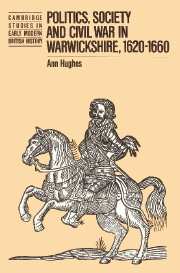Book contents
- Frontmatter
- Contents
- List of maps and plan
- List of tables
- Preface
- Acknowledgements
- Abbreviations and notes
- 1 The social context
- 2 Peers and gentlemen before the Civil War
- 3 Public affairs 1620–1639
- 4 The coming of the Civil War 1639–1642
- 5 Military rule 1642–1649
- 6 Militancy and localism in Warwickshire politics 1643–1649
- 7 The impact of the Civil War
- 8 Politics and religion 1649–1662
- Appendix 1 Local governors 1620–1660
- Appendix 2 Active county committeemen 1643–1647
- Bibliography of manuscript and printed sources
- Index
4 - The coming of the Civil War 1639–1642
Published online by Cambridge University Press: 18 December 2009
- Frontmatter
- Contents
- List of maps and plan
- List of tables
- Preface
- Acknowledgements
- Abbreviations and notes
- 1 The social context
- 2 Peers and gentlemen before the Civil War
- 3 Public affairs 1620–1639
- 4 The coming of the Civil War 1639–1642
- 5 Military rule 1642–1649
- 6 Militancy and localism in Warwickshire politics 1643–1649
- 7 The impact of the Civil War
- 8 Politics and religion 1649–1662
- Appendix 1 Local governors 1620–1660
- Appendix 2 Active county committeemen 1643–1647
- Bibliography of manuscript and printed sources
- Index
Summary
The summer of 1642 saw the inhabitants of Warwickshire intensively involved in the skirmishes and jockeyings for support that heralded the onset of the Civil War; indeed this county was probably the one where divisions were most sharply felt and forcefully pursued. This situation developed not from the intrusion of outside, national forces into a passive locality: as this chapter seeks to demonstrate, the nature of local society, the character of local leadership and the decisions of humbler inhabitants all helped to bring about military conflict.
As we have seen, the delays and difficulties in collecting the third levy of ship money were greater in Warwickshire than in some other counties. However, the county's response to the king's military demands for the war against the Scots was reasonably speedy and efficient, a success attributable to the efforts of the deputy lieutenants alone for at no time in 1639–40 did the Earl of Northampton feel it necessary to be in the county himself.
The efficiency in Warwickshire was not matched by the city and county of Coventry. After the 1635 ship-money conflict Warwickshire's deputy lieutenants were meticulous in keeping the city authorities fully informed of their proceedings and in requesting no more than a fifteenth of the cost of any levy. Despite this, the city fell back on its jurisdictional autonomy in order to evade, as far as possible, the military demands of the government. In January 1639 an exasperated Northampton had written to urge the city to train the (two) horse it contributed to the militia along with the Warwickshire horse, giving the example of Gloucester as a less scrupulous city and county.
- Type
- Chapter
- Information
- Politics, Society and Civil War in Warwickshire, 1620–1660 , pp. 114 - 168Publisher: Cambridge University PressPrint publication year: 1987



